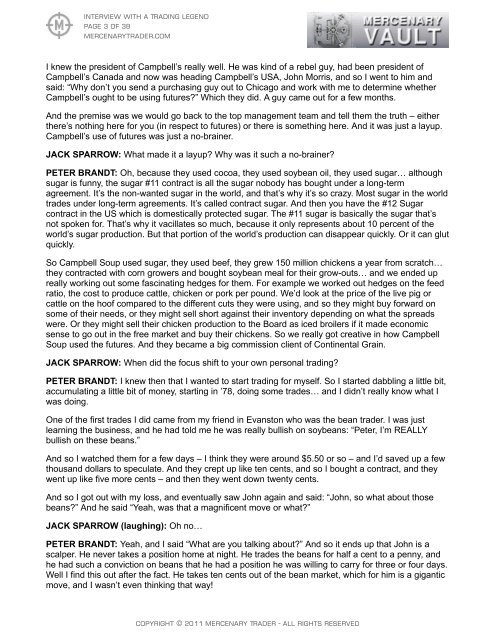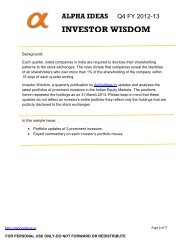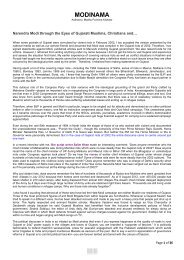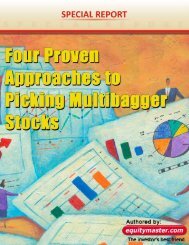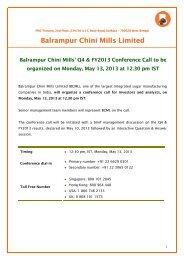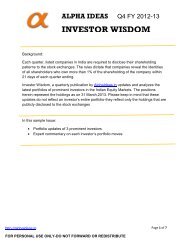Interview With a Trading Legend - Mercenary Trader
Interview With a Trading Legend - Mercenary Trader
Interview With a Trading Legend - Mercenary Trader
Create successful ePaper yourself
Turn your PDF publications into a flip-book with our unique Google optimized e-Paper software.
<strong>Interview</strong> <strong>With</strong> a <strong>Trading</strong> <strong>Legend</strong><br />
Page 3 of 38<br />
mercenarytrader.com<br />
I knew the president of Campbell’s really well. He was kind of a rebel guy, had been president of<br />
Campbell’s Canada and now was heading Campbell’s USA, John Morris, and so I went to him and<br />
said: “Why don’t you send a purchasing guy out to Chicago and work with me to determine whether<br />
Campbell’s ought to be using futures?” Which they did. A guy came out for a few months.<br />
And the premise was we would go back to the top management team and tell them the truth – either<br />
there’s nothing here for you (in respect to futures) or there is something here. And it was just a layup.<br />
Campbell’s use of futures was just a no-brainer.<br />
JACK SPARROW: What made it a layup? Why was it such a no-brainer?<br />
PETER BRANDT: Oh, because they used cocoa, they used soybean oil, they used sugar… although<br />
sugar is funny, the sugar #11 contract is all the sugar nobody has bought under a long-term<br />
agreement. It’s the non-wanted sugar in the world, and that’s why it’s so crazy. Most sugar in the world<br />
trades under long-term agreements. It’s called contract sugar. And then you have the #12 Sugar<br />
contract in the US which is domestically protected sugar. The #11 sugar is basically the sugar that’s<br />
not spoken for. That’s why it vacillates so much, because it only represents about 10 percent of the<br />
world’s sugar production. But that portion of the world’s production can disappear quickly. Or it can glut<br />
quickly.<br />
So Campbell Soup used sugar, they used beef, they grew 150 million chickens a year from scratch…<br />
they contracted with corn growers and bought soybean meal for their grow-outs… and we ended up<br />
really working out some fascinating hedges for them. For example we worked out hedges on the feed<br />
ratio, the cost to produce cattle, chicken or pork per pound. We’d look at the price of the live pig or<br />
cattle on the hoof compared to the different cuts they were using, and so they might buy forward on<br />
some of their needs, or they might sell short against their inventory depending on what the spreads<br />
were. Or they might sell their chicken production to the Board as iced broilers if it made economic<br />
sense to go out in the free market and buy their chickens. So we really got creative in how Campbell<br />
Soup used the futures. And they became a big commission client of Continental Grain.<br />
JACK SPARROW: When did the focus shift to your own personal trading?<br />
PETER BRANDT: I knew then that I wanted to start trading for myself. So I started dabbling a little bit,<br />
accumulating a little bit of money, starting in ’78, doing some trades… and I didn’t really know what I<br />
was doing.<br />
One of the first trades I did came from my friend in Evanston who was the bean trader. I was just<br />
learning the business, and he had told me he was really bullish on soybeans: “Peter, I’m REALLY<br />
bullish on these beans.”<br />
And so I watched them for a few days – I think they were around $5.50 or so – and I’d saved up a few<br />
thousand dollars to speculate. And they crept up like ten cents, and so I bought a contract, and they<br />
went up like five more cents – and then they went down twenty cents.<br />
And so I got out with my loss, and eventually saw John again and said: “John, so what about those<br />
beans?” And he said “Yeah, was that a magnificent move or what?”<br />
JACK SPARROW (laughing): Oh no…<br />
PETER BRANDT: Yeah, and I said “What are you talking about?” And so it ends up that John is a<br />
scalper. He never takes a position home at night. He trades the beans for half a cent to a penny, and<br />
he had such a conviction on beans that he had a position he was willing to carry for three or four days.<br />
Well I find this out after the fact. He takes ten cents out of the bean market, which for him is a gigantic<br />
move, and I wasn’t even thinking that way!<br />
Copyright © 2011 <strong>Mercenary</strong> <strong>Trader</strong> - All Rights Reserved


